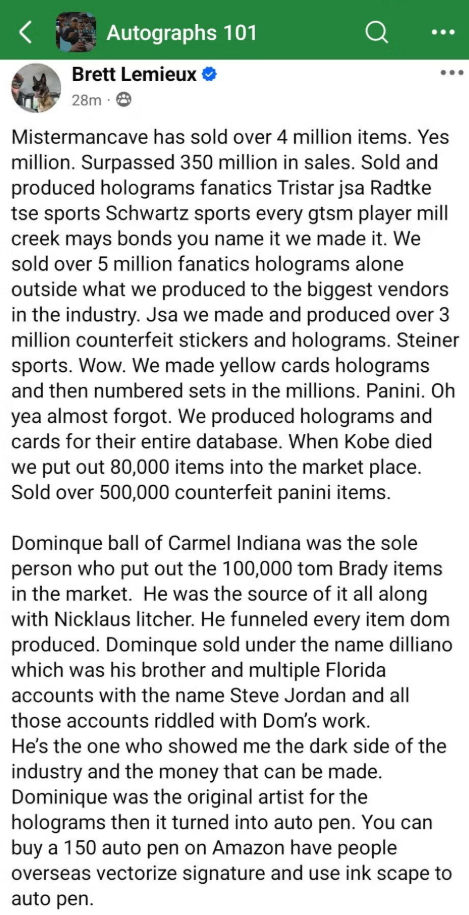In the often glamorous world of sports memorabilia, where authenticity is gold and signed jerseys akin to treasure, a shocking scandal has unraveled, leaving both collectors and dealers with a bitter taste and a mountain of questions. At the morbid heart of this tale is Brett Lemieux, an autograph dealer who trod the line between the legitimate and fraudulent, ultimately becoming the central figure of what could possibly be the most significant counterfeiting operation the memorabilia market has ever seen. The full extent of the scandal remained under wraps until Lemieux was found dead during a police raid in Westfield, Indiana, a dramatic twist straight out of a crime drama series.
Lemieux’s death, reported as a self-inflicted gunshot wound according to the Westfield police, took place while officers executed a search warrant for a multi-million-dollar counterfeit memorabilia operation. Though the Hamilton County Coroner’s Office has yet to officially confirm the cause of death, the raid itself pulled the curtain back on a fraudulent network purportedly dealing in more than four million fake sports items, contributing to an underground market value alleged to reach a staggering $350 million in sales. For anyone who has cherished a signed baseball or hung a framed jersey in their man cave, the revelations are shocking, to say the least.
A post supposedly written by Lemieux himself appeared in the “Autographs 101” Facebook group, where he lifted the veil on his extensive and, until now, successful counterfeiting network. The post acted like a grenade tossed into the halls of collectors’ lairs, detonating suspicions over the legitimacy of countless so-called authenticated items now sitting in collections worldwide. Describing himself as operating through the business Mister Mancave, Lemieux – who painted his business as a treasure trove of framed jerseys and high-value items – now appears more like an illusionist crafting deceits with alarming ease.
Mister Mancave, presenting a facade of operational legitimacy with an address in Columbus, Ohio, didn’t physically exist, at least not as a traditional storefront might. Its incorporation records twice filed in Indiana between 2018 and 2023 adds layers to the murky business dealings of Lemieux’s network. Further complicating this tale were the sophisticated techniques Lemieux claimed to employ, including the counterfeiting of hologram stickers – the industry’s gold standard for authenticity. These stickers, seemingly from reputable companies like Panini, Fanatics, Tri-Star, and James Spence Authentics, offered a false sense of security to collectors, who in turn became unwilling participants in an elaborate charade.
The operation wasn’t isolated to basketball either, as shown by listings such as an Aaron Judge-signed baseball with a Fanatics hologram offered at $399 – a price that seemed too good to be true, because it was. The official price? A hefty $699, marked by the legitimacy of Fanatics. Such ‘bargains’, enticing yet fraudulent, managed to slip past the scrutiny of industry checks, masked by forged holographic stickers that effectively undercut the market’s bona fide sellers.
Now, with the scandal unfurling like a messy spool of yarn, industry leaders are left scrambling to recuperate and restore trust. Fanatics, for instance, had transitioned to using improved hologram technology two years preempting the counterfeiting revelations, working closely with law enforcement and employing fraud experts, including former FBI agents, to tighten the nets and safeguard future transactions.
Yet, what about the audacious claim of $350 million in sales? While some industry players dismiss it as hyperbolic fiction, the chagrin left in the wake of Lemieux’s operation is quite real. Autograph authentication expert Steve Grad emphasizes the new challenges facing the market, wherein sophisticated forgery tools like the autopen further muddy the waters for collectors hoping to spot fakes.
Meanwhile, amidst murmurings and suspicions, there’s a rueful acknowledgment among some dealers who long pegged Lemieux as walking the razor’s edge of legality. “Autographs from athletes who hadn’t done signings in years,” one dealer asserted, were more than red flags—they were alarm bells. Denials ring hollow with the disclosure of an alleged “manifesto” by Lemieux naming others in his network while some, like Wisconsin’s Nickolas Litscher, deny any involvement and are considering legal action to salvage their reputations.
As the dust begins to settle, the scope of Lemieux’s enterprise across various selling platforms under names like Ultimate Sports, Athletes One, Signature Dog, and All-American Authentics remains a talking point. The task at hand for collectors, dealers, and industry stalwarts is as much about damage control as it is about devising a sturdy framework to tackle future fraud.
In light of this scandal, a wake-up call reverberates through the sports memorabilia market, urging greater vigilance, innovative fraud prevention techniques, and a renewed commitment to authenticity in such treasured keepsakes. So, as collectors peer nervously at their prized collections, the question lingers omnipresent: How many of those cherished autographs are the real deal?

